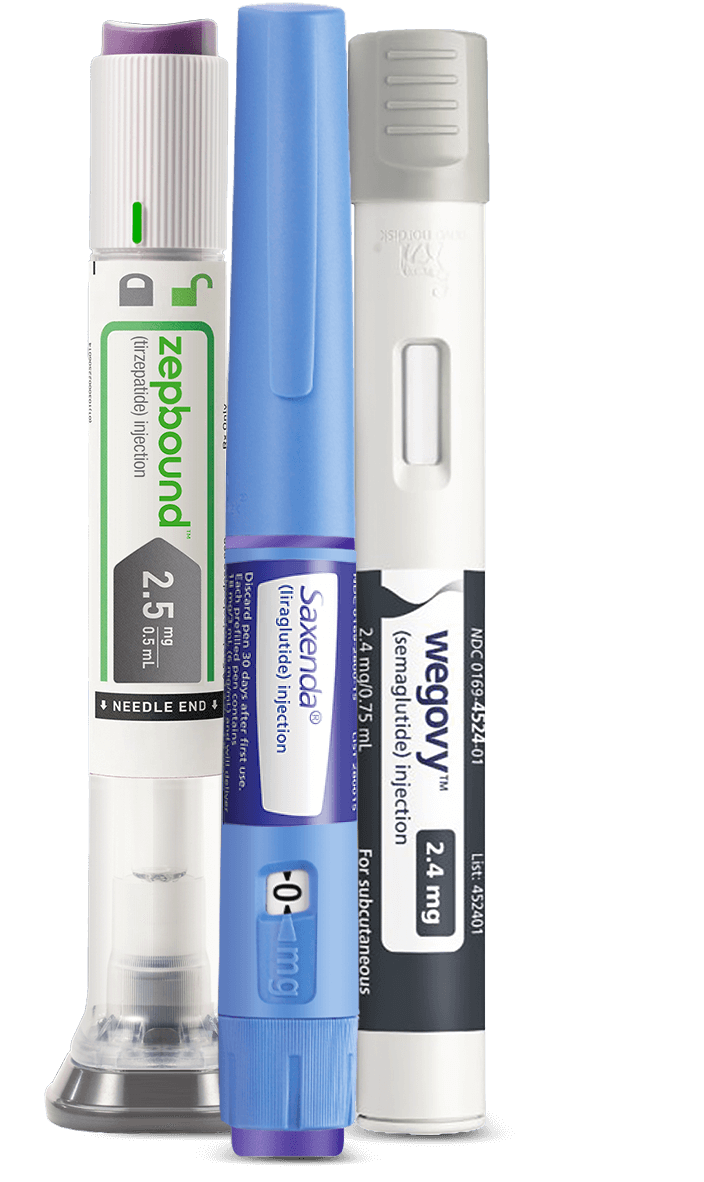Lose Weight With GLP-1 Medication Prescribed Online & Delivered To Your Home*
* Only compounded medications from Wells Pharmacy are delivered to your home. Medications prescribed to your pharmacy may require you to go to your pharmacy to pick them up depending on the programs your pharmacy offers.


How it works
This is a Once in a Lifetime Revolutionary Medication!
Prescription GLP-1 medications mimic natural hormones to regulate digestion and appetite. This makes it highly effective at helping patients lose weight and improve their health.
GLP-1 medications are a recurring weekly injection that work by helping you feel fuller, faster, and for longer. This results in patients eating less and losing more weight.
Lose as much as 10-20% of your body weight
Curb your hunger and cravings for snacking
Clinically proven to cause weight loss
FDA approved and indicated for weight loss
Find out now if you qualify for a GLP-1 medication
and get it shipped to your front door!
Take precaution with and read all warnings concerning GLP-1 agonists, as they may cause serious side effects.
GLP-1 receptor agonists—including semaglutide and tirzepatide—have been prescribed (on-and-off label) for weight management, including obesity, along with a reduced caloric diet and increased physical activity. Take precaution with, and read all warnings concerning, GLP-1s, as they may cause serious side effects, including a risk of thyroid c-cell tumors, pancreatitis, bowel obstructions, and severe gall bladder reactions. Do not use if you or your family have a history of a type of thyroid cancer called MTC (medullary thyroid carcinoma) or MEN 2 (multiple endocrine neoplasia syndrome), a history of pancreatitis, IBS with constipation, other constipating conditions, or gall bladder disease, among others. See important warnings & safety information about these medications.
Being overweight affects so many other aspects of our lives and our self-image. Weight loss can allow you to reduce pain caused by certain medical conditions allowing you to feel better and be more active. Weight loss can create a better self-image allowing you to feel better about yourself. When you feel better about yourself and your life you can reduce anxiety, reduce depression, and engage more in the world, in relationships, and in life’s journey. Losing weight isn’t just about reducing long term medical risks, it’s about reclaiming your life so you can live your best possible you!
APNS has the medical expertise to guide you through your weight loss journey.
APNS practitioners can prescribe a diverse range of weight loss medications, from groundbreaking GLP-1s to additional prescription options.
Take the first step towards a healthier lifestyle and slimmer you.


Faq
Frequently Asked Questions
Glucagon-like peptide-1 (GLP-1) is a type of hormone released into the digestive system after eating. Its main action is to stimulate insulin secretion through potentiating the insulinotropic action of glucose. Endogenous GLP-1 is rapidly degraded primarily by dipeptidyl peptidase-4 (DPP-4).
Gastric inhibitory polypeptide or glucose-dependent insulinotropic polypeptide (GIP) is an inhibitory hormone of the secretin family. It is an inhibitor of gastric acid secretion. Its main role is as an incretin which is a type of hormone that stimulates insulin secretion.
GLP-1 agonists are prescription medications that mimic natural hormones to regulate
digestion and appetite. They mainly work by slowing the overall movement of the digestive tract. This makes you feel full faster and feel fuller longer so you eat less at eat meal and less often throughout the day. These medications are highly effective at helping patients lose weight and improve their health.
They facilitate weight loss by:
- regulating insulin secretion in proportion to environmental glucose levels
- Improving glycemic control
- has a low risk of hypoglycemia
- reduces appetite and energy intake
- delays gastric emptying
- GLP-1 is a hormone made by the small intestines. It works through a number of mechanisms, including:
- Stimulating insulin release from your pancreas: Insulin is an essential hormone that allows your body to use the food you eat for energy. It lowers the amount of glucose (sugar) in your blood. Obesity causes insulin resistance leading to high levels of sugar in your blood which eventually leads to diabetes.
- Blocks glucagon secretion: Glucagon is a hormone your body uses to raise your blood sugar levels when necessary. So, GLP-1 prevents more glucose from going into your bloodstream.
- Slows gastric emptying: GLP-1 slows how quickly food empties from your stomach causing you to feel fuller faster and for longer so you eat less.
- Quiets the “Food Noise”: Through the mechanism of making you feel fuller longer, the signals sent to your brain that make you constantly think about food, the next meal, and what you can snack on are drastically reduced.
GLP-1 agonists are contraindicated in the following medical conditions. If you have, have history, or have family history of any of the following, you would not be a candidate for GLP-1 agonist treatment for weight loss.
- Eating Disorder
- Gallbladder Disease
- Current Drug Abuse
- Current Alcohol Abuse
- Recent Bariatric Surgery (within 1 year)
- Pancreatitis (or history of)
- IBS with constipation (Tirzepatide)
- Gastroparesis
- Retinopathy
- Medullary Thyroid Cancer (or family history of)
- MEN2 (or family history of)
- Currently Pregnant
- Currently Breastfeeding
- Planning to Become Pregnant
What are the different types of GLP-1 agonists?
As of 2024, these are the current FDA approved GLP-1 agonists available on the market
-
Dulaglutide (Trulicity)
-
Exenatide (Byetta)
-
Exenatide Extended Release (Bydureon BCise)
-
Liraglutide (Victoza)
-
Lixisenatide (Adlyxin)
-
Semaglutide subcutaneous (Ozempic)
-
Semaglutide tablet (Rybelsus)
-
Tirzepatide (Mounjaro)
Semaglutide is produced by the pharmaceutical company Norvodisk
Terzapatide is produced by the pharmaceutical company Eli Lilly
Ozempic is semaglutide approved by the FDA for the management of type 2 diabetes
Wegovy is semaglutide approved by the FDA for the management of obesity
Mounjaro is tirzepatide approved by the FDA for the management of type 2 diabetes
Zepbound is tirzepatide approved by the FDA for the management of obesity
Overall, research is showing Tirzepatide to have higher efficacy and bioavailability.
Semaglutide showing higher severity of gastric issues
Semaglutide showing correlation with diabetic retinopathy.
Tirzepatide showing to having greater appetite suppression
Tirzepatide showing incidence of abdominal bloating (can often be resolved with simethicone)
Semaglutide may be safer option for those with IBS-constipation, gastroparesis, or related GI conditions.

Faq
APNS can prescribe any of the GLP-1 agonists currently on the market, however, APNS mainly recommends semaglutide and tirzepatide.
Individual results will vary. Some patients will respond to the medication in the first month. Other patients require a higher dosage before their bodies respond and so they may not see any weight loss for the first few months.
15% body weight loss based on the average weight loss in three 68-week clinical trials of patients on Wegovy without diabetes who reached and maintained a dose of 2.4 mg/week of GLP-1 treatment, along with a reduced-calorie diet and increased physical activity. In a 72-week Zepbound (tirzepatide) study of adults without diabetes, average weight loss was 15.0% (34 lbs) for 5 mg, 19.5% (44 lbs) for 10 mg, 20.9% (48 lbs) for 15 mg, and 3.1% (7 lbs) for placebo. In a 72-week Zepbound (tirzepatide) study of adults with diabetes, average weight loss was 12.8% (28 lbs) for 10 mg, 14.7% (33 lbs) for 15 mg, and 3.2% (7 lbs) for placebo. In a 3-year Saxenda study, adults with pre-diabetes and BMI ≥30 or ≥27 with one or more weight-related conditions were given Saxenda or placebo added to a reduced-calorie meal plan and increased physical activity. At one year, 56% of people on Saxenda lost ≥5% of their weight vs 25% of patients on placebo.
While we do not expect you to follow a specific diet, it is imperative that you begin and continue a low caloric diet. “Intermittent fasting” is also highly suggested. We recommend seeing a dietician if you need assistance in choosing a specific diet which will meet your goals. An exercise plan should also be created and adhered to during your weight loss program. Both of these should become permanent lifestyle modification, which will continue long after your pharmaceutical weight loss treatment is complete. You should not expect to see a significant weight loss with any pharmacological therapy unless you combine with permanent lifestyle modification of both diet and exercise.
If your BMI is 30% or greater, you would qualify for treatment on the basis of being medically classified as obese.
If your BMI is between 25% and 29.9%, you are medically classified as overweight. As such, a comorbidity is required to meet the criteria for GLP-1a treatment. These comorbidities include:
- Hyperlipidemia
- Hypertriglyceridemia
- High cholesterol
- Metabolic Syndrome
- Hypertension
- Nonalcoholic Steatohepatitis (NASH)
- Diabetes
- Prediabetes
- Impaired Fasting Glucose
- Hyperglycemia
- Insulin resistance
- PCOS
- Hypothyroidism
GLP-1 agonists are contraindicated in the following medical conditions. If you have, have history, or have family history of any of the following, you would not be a candidate for GLP-1 agonist treatment for weight loss.
- Eating Disorder
- Gallbladder Disease
- Drug Abuse
- Alcohol Abuse
- Recent Bariatric Surgery (within 1 year)
- Pancreatitis
- IBS with constipation (Tirzepatide)
- Gastroparesis
- Diabetic retinopathy (Semaglutide)
- Medullary Thyroid Cancer (or family history of)
- MEN2 (or family history of)
- Currently Pregnant
- Currently Breastfeeding
Planning to Become Pregnant
What are the side effects?
- Most Common:
- Fatigue
- Nausea
- Second most common
- Constipation
- Diarrhea
- Heartburn
- Dyspepsia
- Headache
- Muscle loss
GLP-1 Cautions and Side Effects.
This medication may have several common side effects. Many patients see resolution of any side effects after a few days to a few weeks, but some patients do have side effects linger.

Faq
Learn More
The current research is showing that both medications are highly effective in facilitating weight loss. When compared to semaglutide, tirzepatide has been found to have a higher efficacy in facilitating weight loss, has fewer incidences of side effects, and less severity of side effects. However, the cost for tirzepatide is significantly higher, at more than twice the cost of semaglutide.
There is no way to know how everyone’s individual insurance plans will cover GLP-1 agonists. However, the current statistics show that most insurance companies are NOT covering GLP-1 agonists, especially when for use only for weight loss and without any comorbidities. Moreover, the pharmaceutical manufacturers for Ozempic and Mounjaro have publicly stated that they do not expect to catch up with demand for years. As such, those few patients whose health plans are covering GLP-1 agonists are finding it difficult to fill their prescriptions since most pharmacies are out of stock.
Imagine if you baked a cake at home instead of buying the cake from the supermarket. A compounded drug is the same drug as that made by the big fancy pharmaceutical companies, but is made by hand by the local pharmacist.
For more information on compounded drugs, visit the Wells Pharmacy website at https://wellsrx.com.
Compounded pharmacies are required to meet rigorous standards by the FDA, states agencies, and the nation’s Pharmacy Compounding Accreditation Board (PCAB). When made by a reputable facility that meets these standards, compounded medications are safe for the patients for which they are compounded.
For more information on compounded drugs, visit the Wells Pharmacy website at: https://wellsrx.com.
- Availability
- Reliability
- Consistency
As stated above, there is a huge demand for these weight loss medications at this time. As such, there is a significant shortage of brand name medications from the pharmaceutical manufacturers. Therefore, using a compounded formulation of a GLP-1a is a viable alternative. By using a compounded medication, a patient can find availability of the medication and trusting that the pharmacy can fulfill their prescription and deliver their medication to their home in a timely manner.
No. compounded drugs are not covered by health insurance plans.
Each vial contains a minimum of 4 doses.
SEMAGLUTIDE
10 UNITS [0.10 ml] [0.25 mg] [1mL vial] – $108
20 UNITS [0.20 ml] [0.5 mg] [1mL vial] – $108
30 UNITS [0.30 ml] [0.75 mg] [2mL vial] – $211
40 UNITS [0.40 ml] [1.0 mg] [2mL vial] – $211
70 UNITS [0.70 ml] [1.75 mg] [4.5mL vial] – $378
100 UNITS [1.0 ml] [2.5 mg] [4.5mL vial] – $378
Maintenance dose 16 UNITS [0.16 ml] SQ EVERY TWO WEEKS [0.4 mg] [1mL vial] – $108
TIRZEPATIDE
15 UNITS [0.15 ml] [2.5 mg] [2mL vial] – $377
30 UNITS [0.3 ml] [5.0 mg] [2mL vial] – $377
45 UNITS [0.45 ml] [7.5 mg] [2mL vial] – $377
60 UNITS [0.6 ml] [10.0 mg] [4.5mL vial] – $701
75 UNITS [0.75 ml] [12.5 mg] [4.5mL vial] – $701
90 UNITS [0.9 ml] [15.0 mg] [4.5mL vial] – $701
Maintenance dose 33 UNITS [0.33 ml] SQ EVERY 2 WEEKS. [5.5 mg] 2 ml VIAL – $377
When compared to semaglutide, tirzepatide has been found to have a higher efficacy in facilitating weight loss, has fewer incidences of side effects, and less severity of side effects. However, it is important to understand that both drugs are highly effective in facilitating weight loss.
Management of Side Effects
- Avoid fried, greasy, or fatty foods and foods high in sugar.
- Eat slowly, and eat smaller meals. If needed, move to 6 small meals a day. Space your meals out 4-6 hours apart.
- Eat foods that are light and gluten free.
- Drink clear and cold drinks
- You can try to inhale deeply an alcohol pad holding a minimum of a centimeter from your nose. Some patients find this as effective as medications such as Zofran used for nausea.
- Try moving your injection site to the thigh region as this has been noted to decrease side effects.
- Ginger chews or ginger lozenges can help reduce this type of nausea
- If none of the above treatments are effective, contact your PCP or your APNS practitioner to prescribe your Zofran or another pharmaceutical grade antiemetic.
- Adequate Rest
- Supplement with B Complex Vitamin
- Adequate Hydration
- Understand Fatigue may be a result of decreased choleric intake, your body will adapt as you continue with the medication
- (Headache) May be a decreased choleric intake / sugar – your body will adapt as you are on this treatment longer.
- For belching or bloating you can use over the counter GasX or generic simethicone.
- Natural DGL or licorice can help with mild to moderate heartburn
- Over the counter Pepcid or generic famotidine or Prilosec or generic omeprazole can be taken if the heartburn is severe or persists.
- Eat foods that are light and gluten free.
- Eat dairy free
- Drink clear and cold drinks
The constipation is a result of these medications slowing gastric emptying and intestinal transit time.
There are a few things that you can do to reduce your chances of developing constipation including:
- Increase your fiber intake 30 g/day. Including vegetables, whole grains.
- Increasing your water intake to at least 64 oz of water daily.
- You may need to add over the counter fiber supplements such as Metamucil or Benefiber.
- If your constipation persists for 3 days, you can also consider taking over-the-counter medications such as Colace or senna which help to soften the stool and make it easier to pass or you could consider MiraLAX as a way to stimulate bowel movements, unless contraindicated.
- If your constipation persists for more than 4 days, you may try over the counter magnesium citrate, a Dulcolax rectal suppository, or an enema.
- If all of these attempts do not produce regular daily bowel movements, contact your primary care provider immediately.
- Please seek in person care if at any time you develop severe abdominal pain, nausea, or vomiting that is a result of your constipation.
- Maintain good hydration throughout the day.
- Supplement with fiber 2-3 times a day with over the counter Metamucil or Fibercon (psyllium husk) to help bulk up stools to reduce diarrhea.
- You can apply a topical antibiotic ointment to your anus to reduce abrasion from excess wiping.
- After about 2 days of diarrhea, if the diarrhea is still persistent, Imodium taken with each episode can help to reduce the diarrhea. But be cautious of constipation with Imodium. If unsure, contact your PCP or APNS practitioner with questions.
- Tylenol or ibuprofen can help. Each can be taken alternatively to maximize effects.
- Get a good night’s sleep or take a nap if possible. Sleep is the most effective way to resolve a headache.
- Stay adequately hydrated.
- Take a multivitamin.
When losing weight rapidly, it is expected to lose muscle in addition to fat. It is important to maintain an adequate intake of protein during your weight loss.
For management of muscle loss:
- Perform weight resistance exercises at least 3 times per week
- Use protein shakes to supplement your daily intake of protein
- The standard amount of protein is 1mg per 1kg of your ideal body weight. Because of the increase risk of muscle loss during rapid weight loss, it is recommended to be ingesting 1.5g per 1kg.
- Divide your goal weight in lbs by 2.2
- Then multiple that number by 1.5 to obtain the number of grams of protein you should be consuming each day
Administering and Managing Your Medication
The video to the right provides instructions on drawing up your medication and injection yourself subcutaneously.
You should inject yourself in the same body area (a couple of finger widths away from your belly button is preferred) only one time each week. You should be sure to inject yourself on the same day of the week every week. You should also inject at a similar time each day. Do not give yourself more than the prescribe amount as you may not give your pancreas sufficient time to adapt or you may risk induing pancreatitis and become hospitalized.
- Store these medications away from direct sunlight or heat.
- It is recommended to store your medication in a temperature regulated refrigerator.
- Prevent these medications from freezing. Once frozen, any injectable medication is not to be used.
- Store the medications with their needles removed.
- Store unopened medications in a temperature regulated refrigerator (2-8 °C Celsius / 35.6-46.4 °F Fahrenheit).
- Store these medications away from the refrigerator evaporator fans in a horizontally position.
- Care should be taken to store your injectable medications out of reach of others or children.
Missing a dose is a significant event in your treatment. You should not miss a dose. However, life happens, and a missed dose may be unavoidable. If you miss a dose, you should make an appointment with your APNS provider or contact your primary care provider to determine how you should continue. Do NOT resume your medication until you have been instructed to do so by a medical provider. If you resume your medication after missing doses and your dose is too high, you may induce pancreatitis and possibly be hospitalized.
Maintaining healthy habits after completing the program is essential in preserving the weight loss you achieve. If you have reached your goal weight, you may discontinue your medication without the need for tapering. However, there is a significant risk of regaining weight without the inhibition for eating that the medication provides. Therefore, for those patients who have not made dramatic changes to their lifestyle in healthy eating and regular exercise, it is recommended to continue with a maintenance dose consisting of a low dose two times per month.
